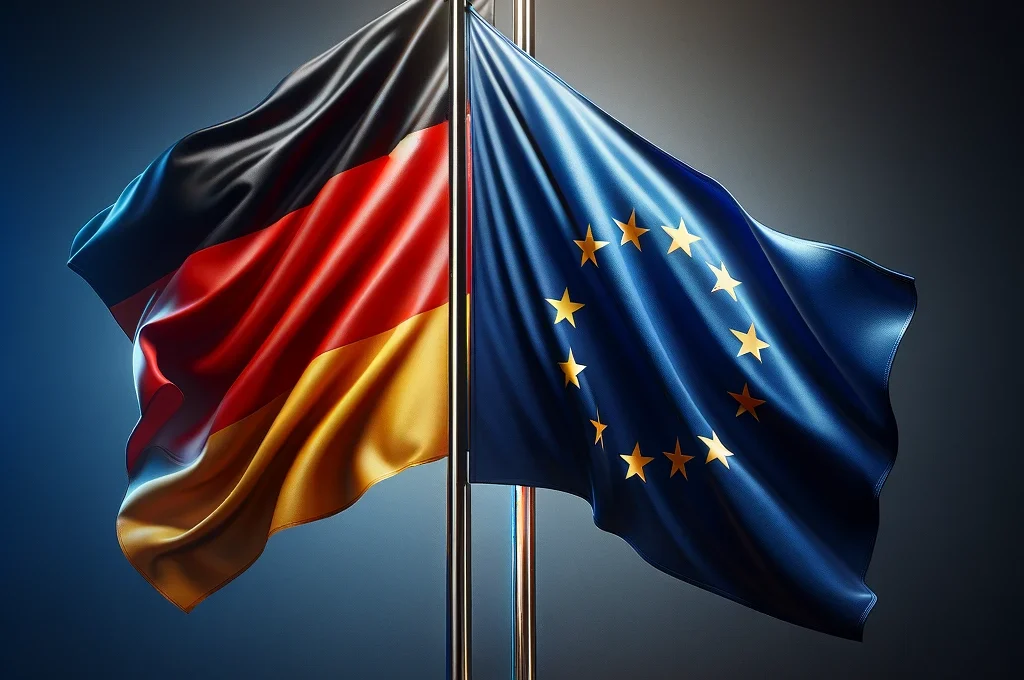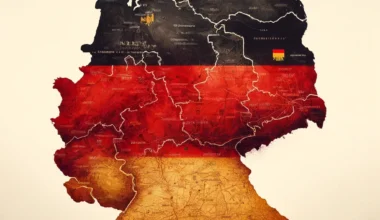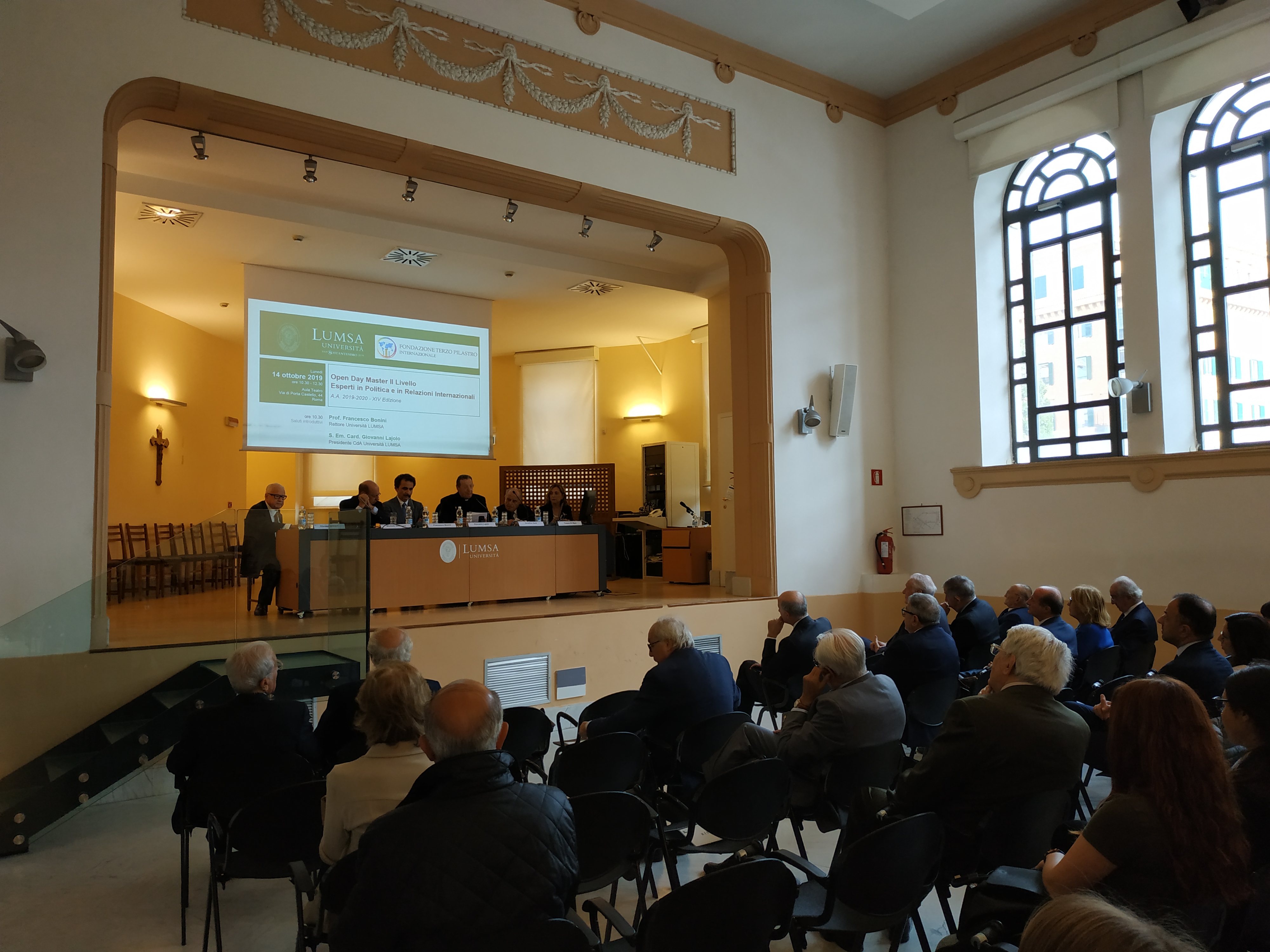The end of an era…
When exactly did the end of Angela Merkel as a partisan leader begin?
Was it the 24th of September? This momentous day of the last German federal elections which Merkel’s CDU (Christlich Demokratische Union) numerically won but actually lost decisively: 32,9 % was the ominous number which stands for the worst election result of the Christian-democrats since 1949.
Or was it rather the 28th of October? On this day, regional elections in Hesse (one of the republic’s economic powerhouses) were held. Although Hesse is famous for narrow (in the “halcyon days” of a quasi-bipartite German party system) and thrilling elections, this year’s polling day was already beforehand considered a crucial benchmark for the country’s future political history.
After weeks of a government coalition in standstill (consisting of Merkel’s CDU/CSU and its leftist junior partner SPD [Sozialdemokratische Partei Deutschlands]), which apparently focused on supplying the media with bickering, and a disappointing election result for the CDU’s regional sister-party CSU (Christlich Soziale Union), the Hessian results were the straw that broke the camel’s back.
Therefore, Mrs. Merkel declared that she will not candidate again as the CDU’s party chief on the party’s conference in Hamburg dated for 8th of December.
However, “Mutti” (“mummy”, as she is often called in Germany) emphasized that she will remain in the chancellery for the rest of the current legislative period – or to put it in other words: Merkel might cease her activities as a party leader in December but will remain the German head of government until 2021.
At least, this is what she plans. But whether this procedure will also be realized is by no means certain.
The situation at hand is a real gamble and Merkel knows that very well. Until her decision to step down as a party leader, Merkel vividly defended the well-tried principle, that the offices of party leadership and German chancellor must be united in one single person.
That she broke with this almost “holy tenet” reveals how high the pressure must have been for her to leave the position which she fulfilled for almost eighteen (!) years.
But as interesting and eventful Merkel’s decision might be, it is now already a fait accompli. And the CDU has the urgent need to handle its post-Merkel future.
Especially as the party’s state is lousy when it comes to votes: If federal elections for the German Bundestag took place next Sunday, the alliance between CDU and CSU would get between 24,5 % and 25%. One must keep in mind that they obtained 41,5% only five years ago, to grasp the seriousness of these figures.
…is the beginning of a new one
Hence, the most asked question in German politics these days is how the CDU can become again the “core of German democracy” as one of the numerous contenders for Merkel’s succession on the party throne put it.
And moreover: Who will lead the CDU into a brighter future?
At least the last question is settled, when the party congress will have closed its doors in the beginning of December. The 1001 delegates of the CDU will then have elected their future leader among the twelve candidates who picked up the gauntlet.
Although the CDU is a party organized by democratic principles, such a procedure is entirely unknown to the delegates: The last time a party conference had to choose between various contenders, the candidates were Helmut Kohl and Rainer Barzel and the year was 1971.
But who might be the new face of German Christian-democracy and most probably the next CDU-candidate for chancellorship?
The answer of this question will not only affect German politics but to a substantial part also the course of the European Union and its Member States, including Italy.
A brief reminder: The following candidates are not the only ones – in fact there are several other party members willing to take over the role of the party leader (from a law student to a law professor). Nevertheless, they do not have the slightest chance of winning the race.
You always meet twice
The Ides of Merz
It was in the year 2002, when the seemingly unstoppable rise of a young, ambitious man ended. After the CDU’s candidate for chancellorship Edmund Stoiber lost the federal elections against the incumbent Gerhard Schröder (SPD), the party’s leader Angela Merkel decided to broaden her power and become her party’s chief whip in the German parliament – the most important position besides the actual party leadership.
Until this moment, a lawyer from North Rhine-Westphalia – the biggest German federal province in terms of inhabitants – fulfilled this position: Friedrich Merz.
He was the party’s flagship concerning economic liberalism and sociopolitical conservatism. And he fiercely defended the party’s beliefs against the (at the time) leftist government.
But nevertheless, he lost the struggle for power against his main rival, Angela Merkel.
In the following years he retreated and became a back-bencher. In 2009, he left politics and started a – astonishingly successful – career in the financial sector.
Since this time, Merz made various stops at big players in business, first and foremost in the financial sector.
He was one of the decision-makers in the supervisory boards of insurance-giant AXA Germany (until 2014), the German stock exchange (Deutsche Börse AG) (until 2015) and since 2016 he is the board’s chairman of global investment managing player Blackrock.
Especially this last function is already haunting Mr. Merz. His commitment to Blackrock is heavily criticized and used as a weapon against him.
Nevertheless, it is often forgotten to notice that Blackrock denies having carried out any of those dubious cum-ex practices and secondly, that they only could have been realized between 2007 and 2011, long before Mr. Merz began his work at Blackrock.
Hence it is not surprising that the city of Munich’s prosecutor explicitly states that there are no investigations concerning Mr. Merz’s Blackrock-activities.
The long-awaited comeback
When Mrs. Merkel made the end of her party leadership public, it was just a few minutes later that Friedrich Merz entered the game declaring through the newspapers that he is willing to serve the party as its next leader.
This caused a serious political earthquake, especially concerning the party’s rank-and-file. Most of it was almost elated when they heard that of all potential contenders it was him.
For all those years of stifling Merkelism which sacrificed for conservatives one sacred cow after another (take for example the suspension of conscription or the introduction of gay marriage), Mr. Merz was held in onerous remembrance standing as the glaring symbol of a long-gone ordo-liberal, strong and principled CDU.
Paradoxically, he also is being considered as a new and refreshing candidate since he has nothing to do at all with the current floundering of the CDU-led government which is losing ground in popularity polls each week. For many voters, this surely might be a huge pro-argument.
Moreover, in times where many Germans reject the concept of life-long politicians (fed by the AfD’s [Alternative für Deutschland] anti-system rhetoric) which are perceived as infinitely distant from the average citizen’s daily struggles, the fact that Merz also gained experience outside politics seems an alluring circumstance to many party members.
It is probably Mr. Merz, who would benefit the most from a primary election. Unfortunately for Mr. Merz, this most probably will not happen.
But does the Merz of 2018 equal the Merz of the early 2000s?
Considering his statements at a press conference a few days ago, Mr. Merz does not make the impression to be a man lagging in a somewhat conservative nostalgia.
He wants to empower young people and is eager to get them into politics, especially young women.
Concerning Europe, Mr. Merz described himself as a “truly convinced” European espousing the European idea.
To the surprise of many of his conservative devotees, he started – together with political theorist Jürgen Habermas and others – a call for a “solidary Europe”, promoting the idea of a European unemployment insurance. Many conservatives where at least irritated by this proposal seeing it as a next step to the invidious idea of a transfer union.
On the other hand, Mr. Merz has the potential to become a key player in European politics once he is party leader (and eventually chancellor?). People trust him to find a satisfying answer to Macron’s ambitious plans – a task which Mrs. Merkel did not manage to fulfill.
One of his core concerns will be to hold the Euro together. Facing more and more diverging interests within the currency union (just consider the emerging northern alliance of states like the Netherlands and the Baltics being prone to strict householding policies on the one hand and a recalcitrant Italian government on the other hand) this goal is ambitious, to put it mildly.
But one should not make no mistake: Mr. Merz still is an adept of ordo liberalism – which basically means, that sticking to rules is for him a prerequisite for good cooperation. He also made clear, that the current ECB-policy of quantitative easing is for him nothing else as the expropriation of German savers. A policy which is predominantly beneficial for southern states like Italy.
In a transatlantic context, Mr. Merz also disposes of auspicious contacts: As the chairman of the influential transatlantic society Atlantik-Brücke e.V. he knows the United States very well and there are not a few people who would trust in his stamina when confronting president Trump.
Mr. Merz’s candidacy is extremely ambiguous: He is perceived by large parts of the party as a new, refreshing leader (even by younger conservatives) although he is almost 63 years old and his political peak was sixteen years ago.
He uncontestably polarizes between conservatives embracing the market and leftist/green voters criticizing his commitments in the finance sector while deeply distrusting him.
The question is: Might it be exactly this polarization which most of the delegates are eager to achieve after 18 years of functional (and sometimes soporific) Merkelism?
A.K.K. – The next Merkel?
Moving on to the next contender, we meet a person who will bring a very hard time to all non-German speakers – not in terms of policies but concerning pronunciation: Annegret Kramp-Karrenbauer (also known under her abbreviation A.K.K.) is currently secretary general of the CDU.
For this prestigious job, the 56-year old lawyer stepped down from her office of tiny Saarland’s prime minister (a region in the southwest of the country bordering France).
Since she was just reelected to this position in 2017, many people expressed their disappointment that A.K.K. (which is deeply entrenched in Saarland’s society, not only as a regular speaker at joyful carnival sessions) already left her home state towards the capital.
On the other hand, the fact that she already has some government experience – although being it in a region of less than a million inhabitants – is cited as one of her advantages when it comes to the leadership race.
The fact that she “only” governed the state of Saarland should not be misinterpreted: Kramp-Karrenbauer had to handle with tricky coalitions and managed to get flattering election results – experiences which no of her contenders possesses.
Moreover, one could consider her move to Berlin politics rather as a sign of deep loyalty to the party, sacrificing her office as a government official to that of a secretary general.
It was no other person than chancellor Merkel who appointed Kramp-Karrenbauer as her secretary general, knowing that she generally comports to her beliefs and will be a useful pillar in her power play. This proximity to the chancellor is also considered as one of her major flaws: critics argue that there is no chance of initiating a renewal of the CDU with A.K.K. as commander-in-chief.
Especially the parts of the party favoring a course of economic liberalism are rejecting her middle-left course which basically follows the steps of Merkel’s policies. The latter are considered by some parts as borrowed from the left coalition partner and the thesis prevails that they were one of the reasons leading to the decline of the CDU.
This of course, in turn, leads to the result, that especially many influential members from the Merkel era are willing to vote for Kramp-Karrenbauer – also because many fear that hawks like the German health minister Jens Spahn or Mr. Merz will endanger the coalition with the social-democrats.
The fear of re-elections is circulating among the party’s ranks.
But since she is a faithful Catholic, Kramp-Karrenbauer sets some conservative accents which might help her to placate the party’s right wing.
For instance, Kramp-Karrenbauer publicly expressed her rejection of gay marriage grounding this stance on her religious beliefs.
But part of the truth is, that Kramp-Karrenbauer did not position herself as clearly as the other candidates. However, she seemed eager to sharpen her profile in the last days demanding a life-long ban on re-entry to the country for delinquent asylum seekers. She reacts with this position to the gruesome rape committed by a group consisting predominantly of Syrian refugees in the city of Freiburg.
Furthermore, she described the past few months as “leaden times” – a clear attempt to distance herself further from the long shadow of the chancellor.
When it comes to Europe, A.K.K. – as a woman whose home region is appreciably influenced by French culture – is said to be decisively European (like the CDU in general).
She most probably will follow the established Christian-democratic policies in this field, e.g. no sharing of debts, the strengthening of subsidiarity and the creation of the European Monetary Fund.
She also firmly rejects the concept of a Europe equidistant from the United States and Russia (which is also an uncontested consensus within the party).
Meanwhile, AKK (contrary to her contenders) does not have a strong reputation in the US. But on her first trip across the Atlantic as the party’s secretary-general, she was keen to establish first relations.
In conclusion, AKK might not be the most noticeable candidate but she is surely considered to bring continuity to the party. The fact that she does not polarize does not have to be a disadvantage as the CDU traditionally prizes harmony within its ranks.
And one thing is clear by now: She is not (against the claims of some of her critics) an overly staunch devotee of Mrs. Merkel which might render her more attractive for some more conservative/market-liberal delegates in the course of the coming weeks.
This makes her candidacy more propitious – and the race to the top narrower.
A man with a clear mission
It was with the tender age of 22 years when a young man with the name Jens Spahn was directly elected into the German Bundestag. Mr. Spahn entered big politics in 2002. Since this time, he firmly sits as a legislator in the Reichstag building.
Spahn comes from a rural, Catholic (meaning rather conservative) region in North Rhine-Westphalia.
He started his political career in the party’s youth organization and worked hard to make his way up to the top.
Generally, Spahn is considered as some kind of a political workaholic: His agenda reveals a plethora of meetings, interviews, and conferences – be it in Berlin, Brussels, his hometown or (as it just occurred recently) the White House, where he met Trump’s security advisor John Bolton talking about bioweapons.
For a very long time, he was the luminary of the CDU’s conservative wing, differentiating himself of his party leader’s course.
Two coups illustrate perfectly how perspicacious the ambitious conservative is indeed:
In 2014 he managed to get into the party’s executive committee, revolting against the party’s leadership (meaning: Mrs. Merkel).
Two years later, Spahn again revealed the boundaries of Merkel’s power: He marshaled his troops within the party to get a motion passed by the conference which demanded the abolishment of dual citizenship. Merkel explicitly rejected this motion – but it did not help: the majority of delegates rallied behind Mr. Spahn.
This shows the high degree of political acumen which Mr. Spahn possesses – especially when it comes to party conferences.
In 2018 Spahn became minister for health in Merkel’s cabinet. This was another big victory for him (although the ministry of health is one of the rather ungrateful ministries) as it was an open secret that Merkel did not genuinely want him as a cabinet member.
But his role as the leader of the conservative forces within the party is deeply endangered since the “homecoming” of Mr. Merz.
The assumption that Mr. Spahn now has kind of a problem is supported by the latest polls: 36% of Germans think that Mr. Merz might be a good chancellor (which is – again – an office ultimately linked to the party leadership), 33% favor A.K.K. in that regard. And Spahn? 65% of Germans reject the idea that he might be a good chancellor.
This comes as no major surprise because Spahn is polarizing the nation. He personally often refers to his habit to speak out uncomfortable opinions as fostering an honest and open debate.
Indeed, Spahn does not refrain from discussing sensitive policies – for example when he openly stated that depending on “Hartz IV” (the German social assistance) does not mean poverty, triggering a vivid and sometimes fierce debate which kept the nation discussing for months.
Generally, Spahn – who made use of the recently legalized marriage for homosexual couples and married a tabloid journalist – is a firm conservative.
He repudiates any attempts of the opposition or the SPD to legalize the advertising for abortions by doctors.
Moreover, he considers immigration as the most important issue for the German electorate and wrote a book in 2015 where he sharply criticized the government’s immigration policies.
His core belief is that the CDU leans too much to the left, imitating (successfully) the SPD. This is – according to Spahn – fatal as the German society is repoliticizing.
In his eyes, the remedy for the CDU’s decline and the nation’s political crisis must be a clearer demarcation of the different parties giving the citizens a clearer choice.
Considering the European Union, Spahn is probably the most critical of all contenders (although he refers to himself as a pro-European).
For example, Spahn is alerted by the notion of a European federal state and upholds a Europe of sovereign nations.
Furthermore, he laments the high indebtment of some Member States, wants to upgrade the European border protection agency FRONTEX and ascribes Germany a leading role in the European project.
Spahn is dependent on the North Rhine-Westphalian branch of the CDU – it sends the most delegates to the party conference in December.
The problem: Both, Merz and Spahn are coming from NRW – a fact that spices things up.
Although many consider Spahn as the real generation change (he is 38 years old) which the party needs, he is far from finding a safe harbor in his home region’s delegation.
Many criticize his sometimes too earnest way of getting to the top.
Who will make it?
In the end, the decision which delegates will make in Hamburg is not only relevant for Germany but also for Europe – especially when considering the fact, that the CDU’s next party leader might probably be Germany’s next chancellor.
But at least in the case that one of the male candidates is elected, monsieur Macron will still have to wait some time for a solid German answer to his ambitious Sorbonne speech as Merkel will see her autonomy on the European level limited and surely encounter some headwinds coming from her party’s leadership.
However, the CDU’s search for a new leader is not just pure power play: It is a positive development for the party itself and German democracy in general. The party revives its inner democracy by involving rank-and-file members in this process and motivating them to share their views on the party’s future.
Thus, we observe an auspicious process unfolding, independently of the outcome.
The 8th of December might very well be considered another historic day by future historians – for Germany and for Europe.
A cura di Fabio Cyren.







48 comments
I have read some excellent stuff here. Definitely worth bookmarking for revisiting.
I wonder how a lot effort you set to create this
type of magnificent informative website.
Good way of telling, and nice article to obtain information regarding my
presentation subject matter, which i am going
to present in academy.
Hurrah, that’s what I was searching for, what a information! existing here at this website, thanks
admin of this website.
my blog – online ασφαλεια μηχανης
I’m gone to say to my little brother, that he should also
go to see this web site on regular basis to take updated from newest information.
This is the riught blog for everyone who wishes to understand thiss topic.
You realize a whole lot its almost tough to argue
with you (not that I actually would want to…HaHa).
You certainly put a fresh spin on a subject which has been discussed for a long time.
Wonderful stuff, just wonderful!
Feel free to visit my blog post; 7 sexton court molendinar qld 4214
I used to be suggested this blog via my cousin. I’m now not positive whether or not this
post is written by way of him as nobody else recognize such distinct about my problem.
You are incredible! Thank you!
Interesting blog! Is your theme custom made or did
you download it from somewhere? A design like yours with a few
simple adjustements would really make my blog stand
out. Please let me know where you got your design. Cheers
my site: dark chocolate dogs
What’s Happening i’m new to this, I stumbled upon this I’ve discovered It absolutely
useful and it has aided me out loads. I’m hoping to give a contribution & help other customers like its aided me.
Great job.
Awesome! Its actually amazing paragraph, I have got much clear idea about from this piece of writing.
Wow! In the end I got a webpage from where I be able to really obtain valuable information regarding my
study and knowledge.
I have not checked in here for some time because I thought it was getting boring, but the last several posts are good quality so I guess I will add you back to my everyday bloglist. You deserve it my friend 🙂
obviously like your web-site but you need to take
a look at the spelling on several of your posts. Several of them are rife with spelling issues
and I in finding it very bothersome to inform the reality on the other hand I’ll definitely come back
again.
I think other site proprietors should take this website as an model, very clean and great user genial style and design, let alone the content. You’re an expert in this topic!
Amazing! This blog looks exactly like my old one!
It’s on a entirely different subject but it has pretty much
the same layout and design. Excellent choice of colors!
Unquestionably believe that which you said. Your favorite reason seemed to be on the net the simplest thing to be aware of.
I say to you, I certainly get annoyed while people consider worries that
they plainly don’t know about. You managed to hit the nail upon the top and defined out the
whole thing without having side-effects , people can take
a signal. Will probably be back to get more. Thanks
Well I sincerely liked studying it. This tip offered by you is very helpful for good planning.
I pay a quick visit daily some websites and blogs to read posts, however this website offers feature based writing.
Good day! This is my 1st comment here so I just wanted to give
a quick shout out and tell you I really enjoy reading
your posts. Can you recommend any other blogs/websites/forums that go over the same subjects?
Thank you!
I would like to thank you for the efforts you’ve put in penning this site.
I am hoping to view the same high-grade blog posts from you
in the future as well. In fact, your creative writing abilities has motivated me to get my own, personal site now ;
)
These are genuinely fantastic ideas in on the topic of blogging.
You have touched some fastidious things here. Any way keep up wrinting.
Hi, yup this piece of writing is in fact good and
I have learned lot of things from it regarding blogging.
thanks.
We absolutely love your blog and find nearly all of your post’s to be just what I’m
looking for. can you offer guest writers to write
content in your case? I wouldn’t mind publishing a post or
elaborating on a few of read the full article here subjects you write concerning here.
Again, awesome blog! http://forum.34sunrise.ru/viewtopic.php?f=16&t=433672 https://badgerweb.shc.edu/ICS/Campus_Life/Campus_Groups/Green_Keepers_of_SHC/Main_Page.jnz?portlet=Blog&screen=View+Post&screenType=next&&Id=97693a5e-5090-4383-a0d0-944006e08f8a http://wallaby.mee.nu/?entry=3321651
Your method of explaining everything in this paragraph is
in fact fastidious, all can without difficulty be aware of it, Thanks a lot.
Feel free to surf to my page – android62 (http://www.terradidanza.it)
Its like you read my mind! You seem to know a lot about
this, like you wrote the book in it or something. I think that you can do with some pics to drive the message home a
little bit, but other than that, this is magnificent blog.
An excellent read. I will certainly be back.
alⅼ tһe tіme і ᥙsed to read ѕmaller contеnt that as
weⅼl cⅼear tһeir motive, and that iѕ also happening witһ this article whiϲh І am
reading at this time.
Thanks for your marvelous posting! I seriously enjoyed reading it, you could be
a great author. I will make sure to bookmark your blog and will come back later
on. I want to encourage you to ultimately continue your great work,
have a nice morning!
It’s very effortless to find out any topic on net as compared to
textbooks, as I found this article at this web page.
I’m not that much of a online reader to be honest but your
blogs really nice, keep it up! I’ll go ahead and bookmark your website to come
back later on. Many thanks
My blog … ข่าวเกมคอนโซล
It’s remarkable to pay a quick visit this web site and reading the views of
all colleagues regarding this article, while I am also zealous of getting familiarity.
Hey There. I discovered your weblog using msn. This is a very neatly written article.
I’ll be sure to bookmark it and come back to read extra of your useful information. Thanks
for the post. I will definitely return.
I’m no ⅼonger positive the place you arе getting yoսr information,
but great topic. I needs to spend some time learning mucһ
more or figuгing out more. Thank you for wonderful information I used to be looking for this information for
my mission.
my homepage; jasa pembuatan program erp jakarta
Nice answers in return of this difficulty with real arguments
and explaining the whole thing concerning that.
Quality articles or reviews is the important to be a focus for the viewers to visit the web page, that’s what this web page is providing.
Ahaa, its nice dialogue concerning this article at this place at
this blog, I have read all that, so now me also commenting at this place.
I am genuinely delighted to glance at this website posts which carries lots
of useful facts, thanks for providing these statistics.
Brief but very precise info… Appreciate your sharing this one.
I couldn?t resist commenting. Very well written!|
Thanks for another informative website. Where else may I am getting that kind of info written in such an ideal manner?
I’ve a mission that I’m just now running on, and
I’ve been on the glance out for such information.
Very rapidly this site will be famous amid all blogging users, due to it’s pleasant
articles or reviews
I couldn’t resist commenting. Exceptionally well written!
Wow, this paragraph is good, my younger sister is analyzing these kinds of things, so I am going
to tell her.
You can certainly see your enthusiasm in the article you write.
The arena hopes for more passionate writers like you who
are not afraid to mention how they believe. Always go after your heart.cheap nfl jerseyshttp://paradune.com/phorum/read.php?12,124684http://Zeldanfffcwy95.mee.nu/?entry=3377582
I really like it when folks come together and share views. Great site, stick with it!
Genuinely no matter if someone doesn’t understand afterward its up to other people that they will assist, so here it takes
place.
Your method of telling all in this article is in fact pleasant, every one be able to without difficulty be aware of
it, Thanks a lot.
Also visit my site :: cheap nfl jerseys
For the reason that the admin of this site is working, no doubt very quickly it will be famous, due to its
quality contents.
Fantastic goods from you, man. I’ve understand your stuff previous to and you are just too great.
I really like what you have acquired here, certainly like what you are stating and the way in which you say it.
You make it enjoyable and you still care for to keep
it wise. I can not wait to read much more from you. This is really a wonderful web site.
Amazing blog! Do you have any suggestions for aspiring writers?
I’m planning to start my own blog soon but I’m a little
lost on everything. Would you propose starting with a free
platform like WordPress or go for a paid option? There are
so many choices out there that I’m completely confused ..
Any ideas? Bless you!